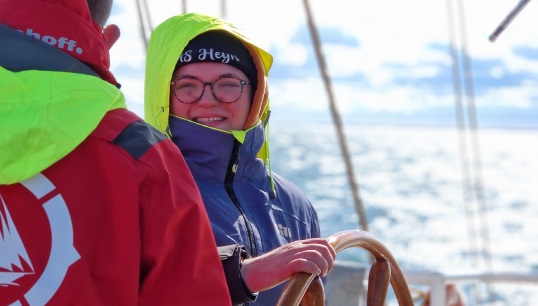- Topics
- Campaigning
- Careers
- Colleges
- Community
- Education and training
- Environment
- Equality
- Federation
- General secretary message
- Government
- Health and safety
- History
- Industrial
- International
- Law
- Members at work
- Nautilus news
- Nautilus partnerships
- Netherlands
- Open days
- Opinion
- Organising
- Podcasts from Nautilus
- Sponsored content
- Switzerland
- Technology
- Ukraine
- United Kingdom
- Welfare
Freshly graduated Dutch second officer Idske Regtien makes unforgettable voyages.
13 June 2024

In the summer of 2023 Dutch member Idske Regtien graduated as a maritime officer 'all ships' from the Scheepvaart en Transport College (STC) in Rotterdam.
What originally attracted you to a maritime career?
My maritime journey started when I was 14 , looking for what to do after graduating high school. Nothing in Utrecht appealed to me. But I heard the stories of people who worked at sea, including a female staff member from the sea scouts . Her adventures and experiences inspired me immensely, and I knew I wanted to sail too. So I decided to enrol in Rotterdam
What do you do?
I currently work as a second officer in Wagenborg's Captain-Managers fleet. My day starts early at sea with navigation watches from 00:00 to 04:00 and from 12:00 to 16:00. I also work several hours on deck, performing various tasks including maintenance of safety equipment, daily check rounds, the medicine cabinet and writing and giving drills.
What have been your learning experiences and challenges?
My training gave me a lot of theoretical knowledge, but the real learning happens in practice. In my experience, the training also connects poorly to how things really work on board. Also, the teachers are increasingly distant from the profession. The sector changes faster than the courses can.
The experiences as an apprentice and sailing have taught me what it means to be a good seafarer. I learned about leadership, respect and the importance of clear communication on board.
Everyone encounters an unreasonable captain, and an annoying crew member, someone you get along with and someone you don't get along with at all. And all that is also the charm of sailing. It is incredibly important to say what you do and do what you say, because trust is essential.
My advice for women who may have to get used to the dynamics of a male-dominated environment is: don't be put off. In my first internship, I had to deal with a women-unfriendly crew, where I was regularly questioned about why I was not at home and why I wanted to work hard.
So what did I do? I walked with an extra bunch of shackles, the long way across deck, and in view of the bosun as much as possible. I made sure I was the first to help, when he needed help. After a week with him on deck, I had proved myself worthy. Later, if even one of the sailors thought I couldn't do it, he said, "She can, just watch!" And off I went! With the European crew I was a bit less lucky. They didn't like having a woman on board.
Fortunately, I now work at Wagenborg, a shipping company that is known for being female-friendly, where gender doesn't matter as long as you do your job well.
Tell us some of your career highlights so far
My travels have given me unforgettable journeys and taken me to many memorable destinations, from the United Emirates to South Korea. But the small villages with narrow fjords which we have to manoeuvre are also impressive.
The strength of a ship, her manoeuvrability or the extreme cold; this also makes every voyage special in its own way.
What are your plans for the future/career aspirations?
At the moment, I cant decide whether to do a bachelor degree in shipping, or explore other types of sailing. Either way, I want to keep sailing for a while and then decide whether to navigate in another new direction.
Tags
